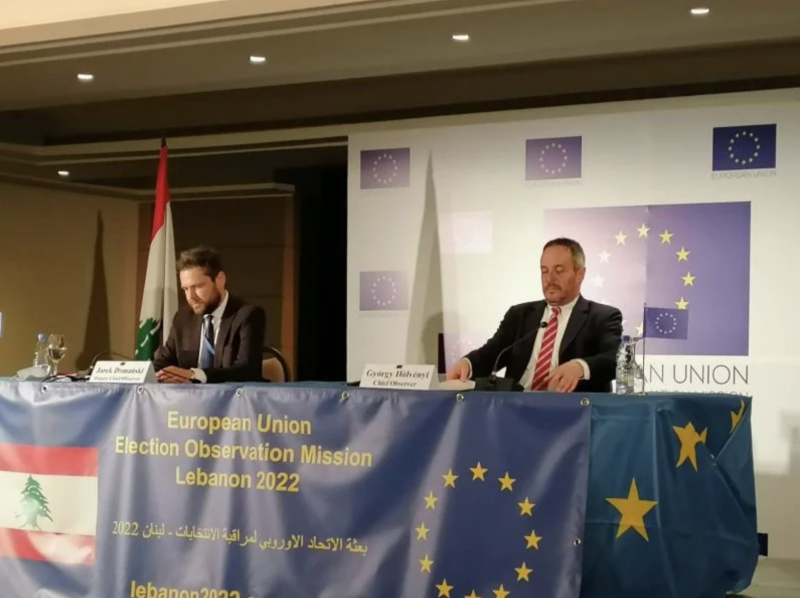
Gyorgy Holvenyi (r.) delivers an update on the EU elections observation mission at a press conference in Beirut on April 11, 2022. (Credit: Abby Sewell / L'Orient Today)
BEIRUT — In a preliminary report on the results of their monitoring of the electoral process in Lebanon, the European Union Election Observation Mission noted that election preparations were affected by "limited financial and human resources" and that the process was “overshadowed by widespread practices of vote buying and clientelism, which distorted the level playing field and seriously affected the voters’ choice.”
Nevertheless, Chief Observer György Hölvényi praised the fact that the elections went forward at all and said that the results were “valid.”
The EU observers were deployed around the country beginning March 27 and in polling centers in all districts and sub-districts of Lebanon on election day.
The delegation noted “localized tensions” on the day of elections, an evident “lack of training” by poll workers, and that campaign representatives “were present in high numbers, controlling voter attendance, and often displaying intrusive behavior,” adding that “the secrecy of the vote was not always guaranteed.”
The report noted that “freedom of expression was mostly respected during the campaign period, although there were cases of intimidation and … in contradiction of the law, the media failed to provide equal visibility to all candidates and candidate lists.” The Policy Initiative documented which candidates received the most airtime from April 16 to May 10, in a tweet.
While all but one of the EU teams were able to observe the closing of stations and counting of votes without restrictions, the report said, an observer team in Rashaya “was expelled from a polling station by the Lebanese Armed Forces and only allowed back in when the counting process had finished.”
The report also noted some errors related to the counting procedures, such as not reconciling the number of ballots cast with the number of voters who signed voter lists.
“On a positive note,” it added, the teams “only observed one case in which electricity cuts hampered the closing and counting procedures.”
Jarek Domanski, deputy chief observer with the mission, said from the team's observations, sporadic incidents of intimidation and of campaign events "did not have a serious impact" on the final results, but that the practice of vote buying and clientelism was "systemic, and in our opinion did distort the election process."
Brandon Benifei, head of the delegation, noted that a “huge injection of foreign funds” to the campaigns had fed into a "widespread practice of vote buying." He declined to specify the sources of the foreign funds in question but recommended that there should be greater transparency regarding the reporting on the source of campaign funds.
Benifei also noted that none of the recommendations issued by a similar EU monitoring team in 2018 had been implemented, particularly with regards to strengthening the Supervisory Commission on Elections. Hölvényi said that the commission lacked the funds, human resources and "basic equipment" to properly monitor the elections. The commission’s head told L’Orient Today the day after elections that the body had still not received any funds from the Interior Ministry to carry out its mission.
With regards to diaspora voting, Domanski said that votes from four polling stations abroad had been canceled because the boxes were lost, one was canceled because the material that arrived was incomplete, and two polling stations were not canceled despite the material being incomplete. He did not specify how many votes were impacted in total.
He noted some improvements in accessibility of voting stations to people with disabilities with 51 percent of stations visited by the team having voting facilities on the ground floor, but said that only 43 percent of the stations were determined to be accessible to people with reduced mobility.